
The India-EU Trade and Technology Council (TTC) Working Group 2 on Green & Clean Energy Technologies organized an online workshop on “Assessment and Monitoring Tools for Marine Plastic Litter ” on 8th November, 2024, bringing together experts and officials from India and the European Union (EU) to address plastic pollution and discuss innovative monitoring solutions. The workshop focused on exploring new digital tools for monitoring plastic waste and understanding India’s unique challenges in combating plastic litter.
The event began with opening remarks by Dr. Marianne Olsen, Research Director at the Norwegian Institute for Water Research (NIVA), who welcomed participants and set the stage for collaborative discussions. Dr. Parvinder Maini, Scientific Secretary, Office of the Principal Scientific Adviser to the Government of India, and Ms. Signe Ratso, Deputy Director-General for International Cooperation at the Directorate-General for Research and Innovation, European Commission, delivered inaugural addresses, emphasizing the need for joint efforts to tackle plastic pollution through research, technology, and shared expertise.
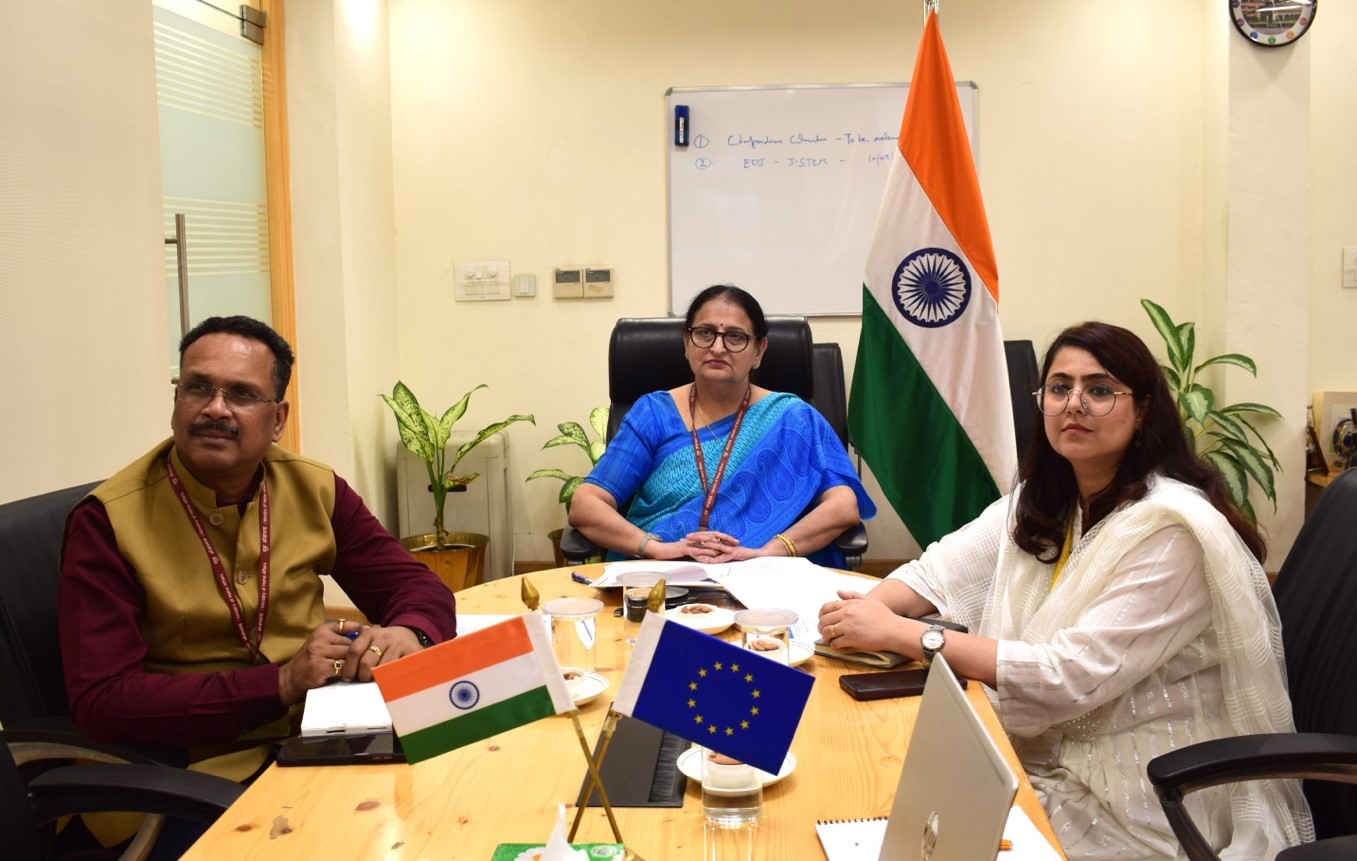
(Dr. Parvinder Maini, Scientific Secretary, Office of the Principal Scientific Adviser to the Government of India delivering the inaugural address)
Dr. Parvinder Maini emphasized the importance of collaboration, stating, “This partnership between India and the EU on plastic litter monitoring and reduction is not only timely but essential for developing solutions that are globally impactful and locally viable.” Ms. Signe Ratso highlighted the workshop’s significance, remarking, “it shows the excellent cooperation between the EU and India in sharing technological innovations and discussing matters of common interest in the framework of the recently established Trade and Technology Council.”
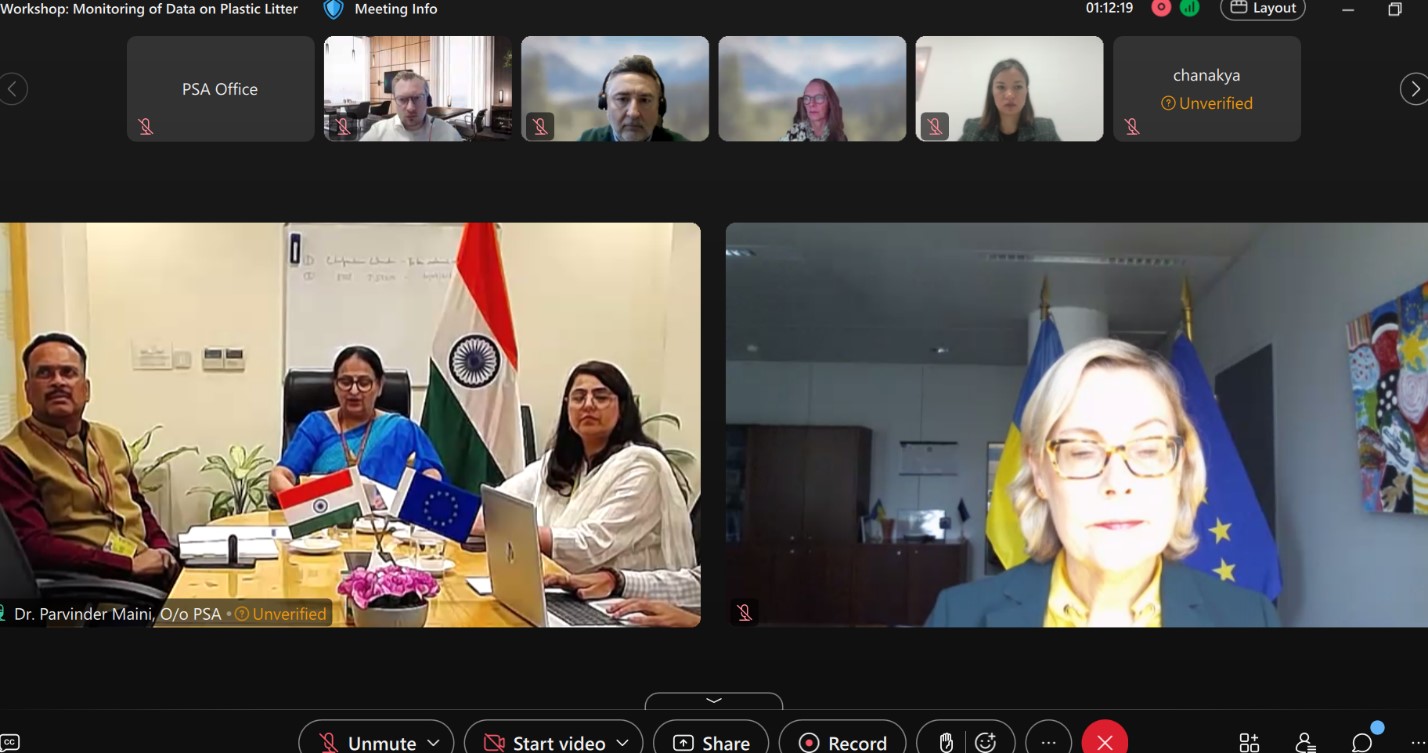
(Ms. Signe Ratso, Deputy Director-General for International Cooperation at the Directorate-General for Research and Innovation, European Commission highlighting the workshop’s significance)
The workshop agenda included a detailed presentation on the Indian context regarding plastic pollution by Prof. H N Chanakya, Chief Research Scientist at IISc Bangalore. This was followed by an introduction to an e-learning tool designed by the NIVA team to assist in monitoring plastic litter. The session, led by Prof. Bert Van Bavel and Dr. Oda Ellingsen from NIVA, provided insights into the tool’s methodology and showcased its three modules, including two introductory modules and one focused on Thermo Analytical methods for assessing plastic waste.
As part of the workshop, Indian experts presented their perspectives on the specific needs and challenges faced in the Indian context and provided feedback on the e-learning tool. Presentations were made by Dr. Smita Mohanty, Senior Principal Scientist at CIPET, Bhubaneswar; Prof. E V Ramasamy, Former Prof, MG University, Kerala; Dr. K. Ramu, Scientist F at the National Centre for Coastal Research, Ministry of Earth Sciences; and Dr Mahua Saha, Principal Scientist, CSIR-National Institute of Oceanography. Each expert highlighted the regional requirements and offered valuable feedback into the e-learning tool’s application in Indian scenarios.
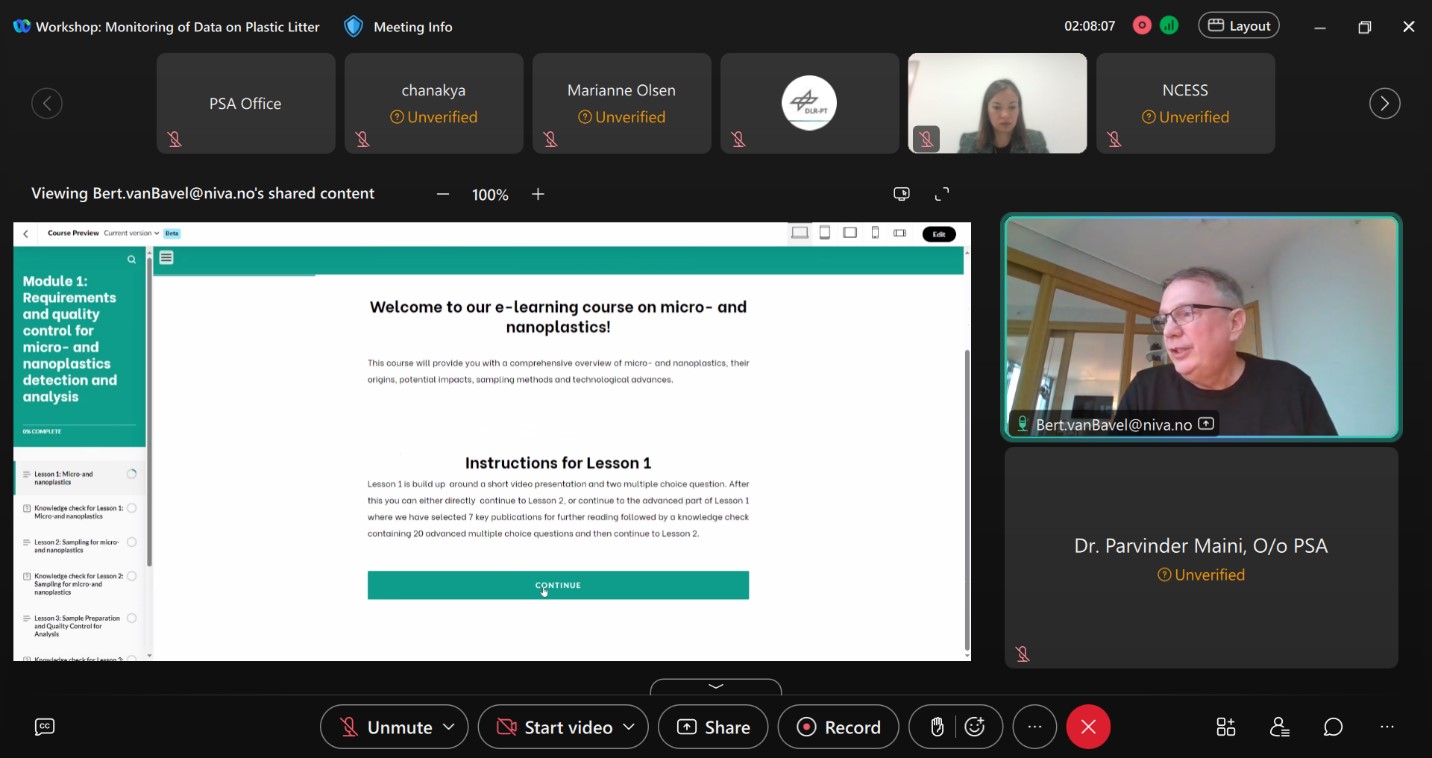
(Prof. Bert Van Bavel from NIVA providing insights into the e-learning course)
The event featured an interactive panel discussion where participants engaged with the NIVA team, sharing feedback and discussing future collaborations on developing tailored e-learning modules, exchanging best practices in data monitoring, exchanges of information on existing technologies/solutions, initiating joint research projects, and capacity building to enhance efforts in combating plastic pollution. Towards the end of the workshop, a questionnaire was circulated to assess the participants’ views on the e-learning tool and gather suggestions for further improvement. In the concluding session, Dr. Hafsa Ahmad, Scientist ‘D’ at Office of the Principal Scientific Adviser to Govt. of India, along with Mr. Kinchit Bihani from the EU Delegation to India announced an upcoming Ideathon initiative, aimed at fostering innovation and strengthening India-EU cooperation in tackling plastic pollution.
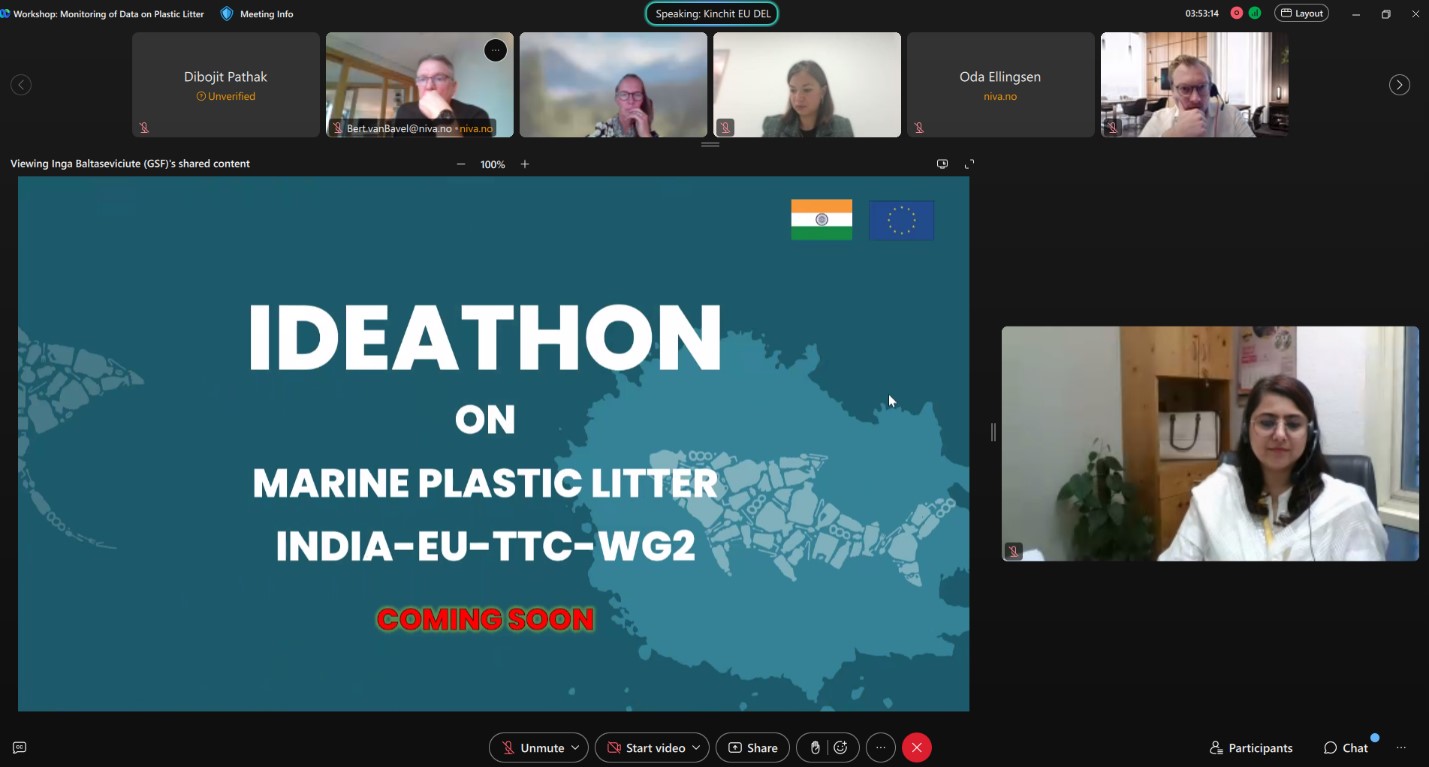
(Launch of Ideathon on Marine Plastic Litter)
The workshop concluded with official closing remarks delivered by Dr. Monoranjan Mohanty, Adviser at Office of the Principal Scientific Adviser to Govt. of India, and Ms. Nienke Buisman, Head of the International Cooperation Unit at the Directorate-General for Research and Innovation, European Commission.
Dr. Parvinder Maini and Ms. Signe Ratso expressed gratitude to the participants for their active engagement and reiterated the commitment of the EU and India to jointly combat plastic pollution through data-driven approaches and mutual cooperation.
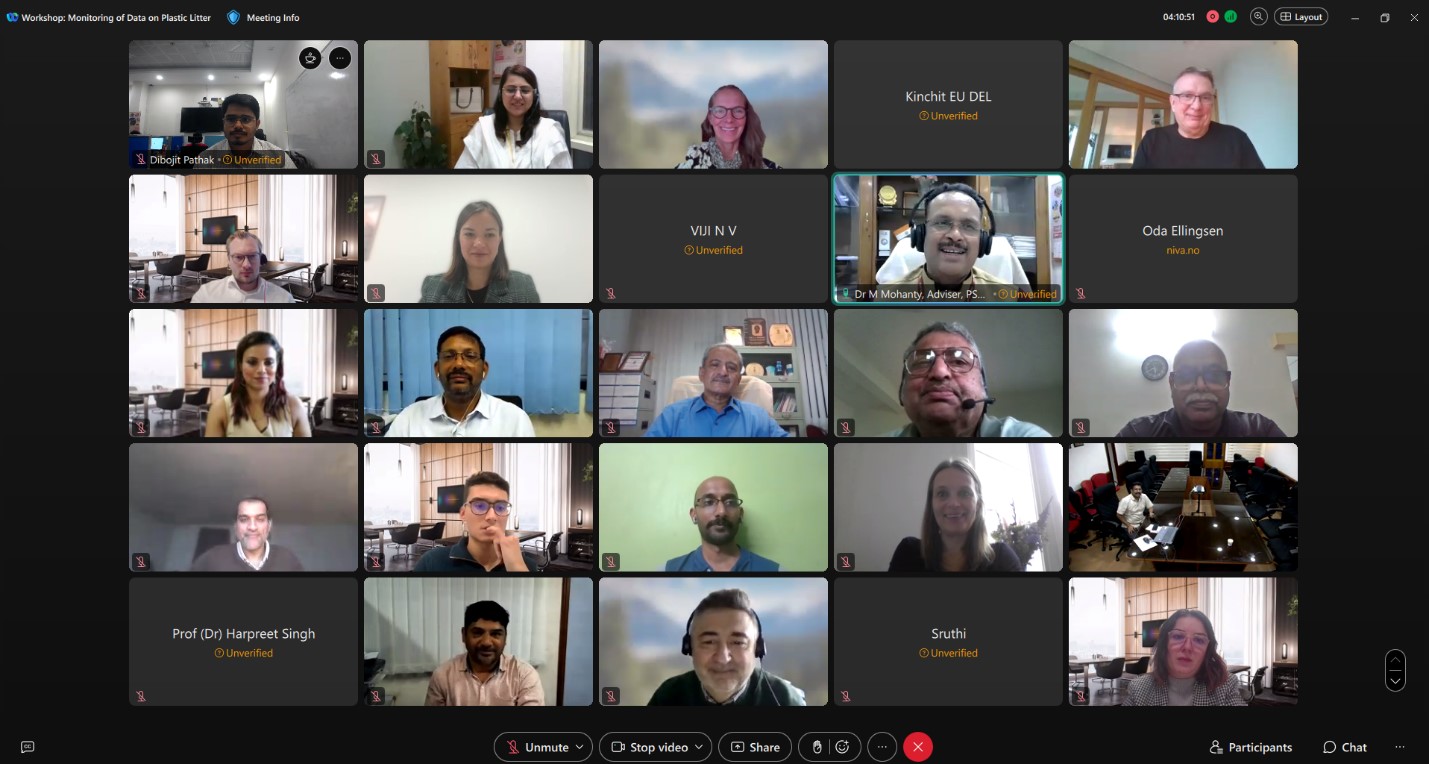
(Group photo of workshop’s participants)
The workshop witnessed active participation from senior Indian government representatives, line ministries, and experts from academic and research institutions across India and the EU, marking a significant step in the shared mission of addressing environmental challenges through technology, innovation, and international cooperation. The workshop was attended by thirty Indian participants.
The India-EU Trade and Technology Council has become a bedrock of our bilateral scientific and technological co-operation. Successful completion of this workshop has just added another milestone to our engagement.
About the Trade and Technology Council set up by India and the EU
The India-EU Trade and Technology Council (TTC) was first announced by the European Commission President, Ursula von der Leyen, and India’s Prime Minister, Narendra Modi, in April 2022. Established on February 6, 2023, this strategic coordination mechanism allows both sides to tackle challenges at the nexus of trade, trusted technology, and security, and deepens cooperation in these fields. Establishing India-EU TTC is a key step towards a strengthened strategic partnership for the benefit of all people in India and the EU.
The TTC is a key forum to deepen the strategic partnership on trade and technology between the two partners. Geostrategic challenges have reinforced the EU and India’s common interest in ensuring security, prosperity, and sustainable development based on shared values.
The TTC consists of three Working Groups:
- Working Group 1 on Strategic Technologies, Digital Governance and Digital Connectivity
- Working Group 2 on Green and Clean Energy Technologies; and
- Working Group 3 on Trade, Investment and Resilient Value Chains.
Working Groups are now jointly working to advance identified objectives and key actions. The India-EU TTC Working Group 2 on Green and Clean Energy Technologies is being led by the Office of the Principal Scientific Adviser to the Government of India from the Indian side and the Directorate-General for Research and Innovation of the European Commission from the EU side.
Both sides expect to report at the next TTC Meeting at Ministerial level, in 2025, on the progress made in this area through initiatives such as this workshop on Assessment and Monitoring Tools for Marine Plastic Litter. The outcome of the India-Eu-Trade and Technology Council WG2 cooperation on marine Plastic Litter will be reflected during the next leaders summit in 2025.
*****
MJPS/ST

